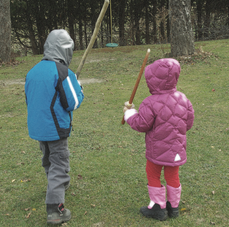 Image: Ano Lobb
Image: Ano Lobb The key findings of the research that are most interesting to me (see, personal pronouns) are that "Looking older isn't necessarily about wanting to be 'sexy' - Adult's fears of children "growing up too soon" are disconnected from children's own experiences. Boys and girls talked about "looking older" or "looking sexy" in very different ways." and that "Boyfriend and girlfriend cultures are prevalent in children’s social worlds, but experienced in diverse ways. Many children talked about the pressure to participate in boyfriend-girlfriend cultures in school, making boygirl friendships almost impossible. These pressures were particularly acute for girls."
| At the one point in life where humans aren't hampered by boobs (to be visually distracted by or keep from jiggling), erections (to be visually distracted by or keep from...poking), or physical embarrassment because, bar genitals, girls and boys look the same, they are gendered. | when examining the relationships between girls and boys the absence of the tomboy seems a rather glaring omission. |
And presumed active heterosexuality equals girlfriend/boyfriend relationships. I think part of this feeds into the desire to look older, however it also contributes to the anxious instability of the acceptable and unacceptable boyfriend-girlfriend and boy-girl relationships. !Many boys and girls had little choice but to participate in or witness a variety of practices such as 'fancying', 'dating' and 'dumping', for example, who 'liked', 'loved', or was 'hot' for who. This was particularly the case in children's talk about their final year of primary school."
One 12 year old boy, Jared, told the researchers that he: "got called strange by boys...(cos) me and this girl Alice used to hang out. So in the end we made up a lie that we were cousins." To be a boyfriend or to have girls as friends is seen as being too feminine by some boys and evidently the idea of simply enjoying someone of the opposite sex's company is too complex for either parents or peers to comprehend.
The study seemed to find that girls were rather more interested in being a girlfriend. Because it was quite grown up and proved you weren't a "minger." It skipped any issue of being a tomboy, though one can't help but wonder if Jared's Alice doesn't fall into the tomboy category.
A lot of women profess to have been a tomboy. Rather like my theory about everybody wanting to have been the loner at school (we can't all have been loners, we might all have felt teenage isolation in a 'am I the only one stuffing my bra with toilet tissue?'* way but not actually been friendless) when geek chic was at its height, I fear we can't all have been tomboys.
Unlike the slightly effeminate boy, who is only now becoming more acceptable, a tomboy has always been viewed as quite noble. Hence why you often hear heterosexual women retelling the story of when she cut all of her Barbie's hair off but never a heterosexual man discussing the pram he asked for the Christmas of 1989.
Laura Barton recently presented a radio documentary about her tomboy past and discussed with other tomboys how they had loved the unquestioning acceptance of boys. The tomboys hadTracy Beaker, Mick Kelly and Scout Finch as their heroines. In fact, when examining the relationships between girls and boys the absence of the tomboy seems a rather glaring omission.
Which leads me to fret, is the tomboy dying out? And if so is it a casualty of hyper sexualisation? Of girls being incomplete until they can become not 'girl' but 'girlfriend' to a boy? I hope that is not true and the next generation of girls will also get to experience the warm acceptance of being one of the boys. Or, not to be too Daily Mail about it but heck let's go there, one of the children.
*example plucked from nowhere.
Squeamish Kate


 RSS Feed
RSS Feed
